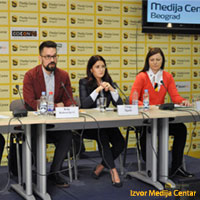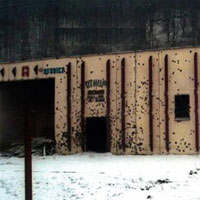
The Basic Public Prosecutor’s Office in Stara Pazova has filed misdemeanour charges against nine activists of the Youth Initiative for Human Rights over the incident that happened on January 17 2017 in the Vojvodina village of Beška. The activists interrupted a forum hosted by the Srpska napredna stranka (Serbian Progressive Party) as a sign of protest, because one of the speakers was the convicted war criminal Veselin Šljivančanin. They were forcibly expelled from the auditorium, beaten and injured. The Humanitarian Law Center believes that the decision of the Prosecutor’s Office in Stara Pazova to initiate legal action against the attacked activists is an indicator that state institutions are siding with war criminals and charging those who take a stand to oppose them.

The Initial report on the implementation of the National Strategy for the Prosecution of War Crimes, and the results of the opinion polls on „Awareness of the citizens of Serbia about the wars of the 90s, war crimes and war crimes trials“, were presented on Monday, December 18 2017, at a conference organized by the Humanitarian Law Center (HLC) and the daily newspaper ‘Danas’.
Sorry, this entry is only available in srpski.
Sorry, this entry is only available in srpski.
The head of the Army of Serbia is a man of a problematic past; those convicted or suspected of war crimes are deputies in Serbia’s parliament — they can be found in the top ranks of ruling parties, whereas the highest officials get advice from, and shake hands with, convicted war criminals, some being lecturers at the Military Academy.This is the image of Serbia today, more than 20 years after wars in Croatia and Bosnia and Herzegovina ended, and almost 20 years since the termination of the war in Kosovo.
During the war in Kosovo, General Ljubisa Dikovic was the commander of the 37th Motorized Brigade of the Army of Yugoslavia (VJ), within whose area of responsibility (the area of Drenica), from late March to the middle of June 1999, around 1,400 Kosovar Albanian civilians were murdered, and tens of thousands of people were banished.
Sorry, this entry is only available in srpski.

The Court of Appeals in Belgrade has dismissed (available in Serbian) the indictment filed against eight members of a Special Brigade of the Republic of Srpska Ministry of the Interior, accused of killing 1,313 civilians from Srebrenica in the Kravice hangar on July 14th, 1995 (Srebrenica – Kravica Case), with the explanation that the indictment was not filed by an authorized prosecutor. The Humanitarian Law Center thinks such a decision represents an inadmissible failure of the local judiciary, which will further jeopardize the process of war crimes trials, already deemed to be too slow.
 New report by leading NGO says if Serbia maintains its current slow pace in prosecuting war crimes, less than 10 per cent of alleged culprits will face due process in the next 10 years.
New report by leading NGO says if Serbia maintains its current slow pace in prosecuting war crimes, less than 10 per cent of alleged culprits will face due process in the next 10 years.
Trials for war crimes in Serbia in 2016 were hampered by lack of political will to face the past, glorification of war criminals and inefficiency on the part of the prosecution, a new report from the Humanitarian Law Centre presented on Thursday said.
 In March 7th and 8th, 2017, the Serbian delegation presented the Third Periodic Report on the Implementation of the International Covenant on Civil and Political Rights before the UN Committee for Human Rights in Geneva. The report contains data on the prosecution of war crimes in Serbia. During the discussion with the Committee experts, the delegation offered a distinctly tendentious presentation of the information about the work of state authorities responsible for the prosecution of war crimes, or presented completely false information, all with the aim of creating an illusory image of high efficiency. The Humanitarian Law Center (HLC) believes that such actions on the part of the delegation illustrate the relationship that the Republic of Serbia has towards its international obligations in the field of human rights, including those obligations derived from the accession negotiations with the European Union. Serbia tends to meet only the minimum formal requirements of international bodies, and creates an illusion of efficiency without the ambition to substantially fulfill its obligations.
In March 7th and 8th, 2017, the Serbian delegation presented the Third Periodic Report on the Implementation of the International Covenant on Civil and Political Rights before the UN Committee for Human Rights in Geneva. The report contains data on the prosecution of war crimes in Serbia. During the discussion with the Committee experts, the delegation offered a distinctly tendentious presentation of the information about the work of state authorities responsible for the prosecution of war crimes, or presented completely false information, all with the aim of creating an illusory image of high efficiency. The Humanitarian Law Center (HLC) believes that such actions on the part of the delegation illustrate the relationship that the Republic of Serbia has towards its international obligations in the field of human rights, including those obligations derived from the accession negotiations with the European Union. Serbia tends to meet only the minimum formal requirements of international bodies, and creates an illusion of efficiency without the ambition to substantially fulfill its obligations.
Sorry, this entry is only available in srpski.











 In March 7th and 8th, 2017, the Serbian delegation presented the Third Periodic Report on the Implementation of the International Covenant on Civil and Political Rights before the UN Committee for Human Rights in Geneva. The report contains data on the prosecution of war crimes in Serbia. During the
In March 7th and 8th, 2017, the Serbian delegation presented the Third Periodic Report on the Implementation of the International Covenant on Civil and Political Rights before the UN Committee for Human Rights in Geneva. The report contains data on the prosecution of war crimes in Serbia. During the